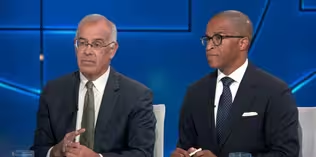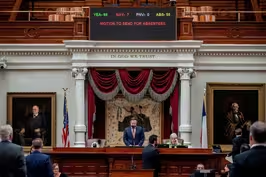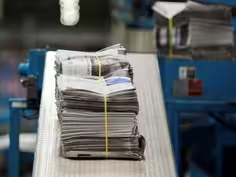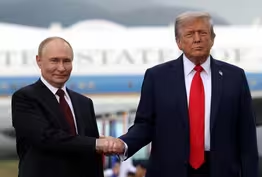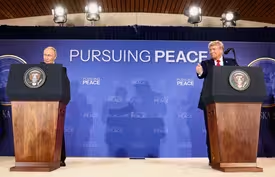
Ex-State Department official analyzes Trump-Putin summit
Clip: 8/15/2025 | 6m 6sVideo has Closed Captions
'Putin stuck to his guns': Former State Department official analyzes Trump-Putin summit
For a recap of the summit between President Trump and Russian President Vladimir Putin, Geoff Bennett spoke with Andrew Weiss. He's a former State Department official who served in the George H.W. Bush and Clinton administrations, and is currently serving as vice president for studies at the Carnegie Endowment for International Peace.
Problems playing video? | Closed Captioning Feedback
Problems playing video? | Closed Captioning Feedback
Major corporate funding for the PBS News Hour is provided by BDO, BNSF, Consumer Cellular, American Cruise Lines, and Raymond James. Funding for the PBS NewsHour Weekend is provided by...

Ex-State Department official analyzes Trump-Putin summit
Clip: 8/15/2025 | 6m 6sVideo has Closed Captions
For a recap of the summit between President Trump and Russian President Vladimir Putin, Geoff Bennett spoke with Andrew Weiss. He's a former State Department official who served in the George H.W. Bush and Clinton administrations, and is currently serving as vice president for studies at the Carnegie Endowment for International Peace.
Problems playing video? | Closed Captioning Feedback
How to Watch PBS News Hour
PBS News Hour is available to stream on pbs.org and the free PBS App, available on iPhone, Apple TV, Android TV, Android smartphones, Amazon Fire TV, Amazon Fire Tablet, Roku, Samsung Smart TV, and Vizio.
Providing Support for PBS.org
Learn Moreabout PBS online sponsorshipGEOFF BENNETT: And, for more, let's turn now to Andrew Weiss.
He's a former State Department official who served in the George H.W.
Bush and Clinton administrations.
He's now vice president for studies at the Carnegie Endowment for International Peace.
Thank you for being with us.
ANDREW WEISS, Carnegie Endowment for International Peace: Great to be with you.
GEOFF BENNETT: So an agreement to keep the talks going potentially in Moscow.
We will see what happens.
What's your early assessment of this summit and what it yielded?
ANDREW WEISS: I think there was a lot of focus, a lot of overinflated expectations going into today's meeting.
President Trump, at the beginning of the week, said, oh, I'm just going to feel Putin out, and then later on yesterday was saying it was a 75 percent likelihood of a big breakthrough.
What we saw just now is that Vladimir Putin stuck to his guns.
That is the same Vladimir Putin who has been saying that Ukraine is not a real country.
He repeated that point today.
It's the same Vladimir Putin who said that the war will only end if the root causes are addressed, which is code for the U.S. and NATO security presence in Europe.
It's code for cooperation between Western countries and Ukraine.
It's a denial of Ukraine's legitimacy to exist.
It's the same Vladimir Putin who has been stringing Donald Trump all along.
They alluded to some kind of deal that they're at least going to shop to the Ukrainians and the Europeans.
But we will see what the elements of that are.
Last week's Russian proposal was a sham.
And we will see if this deal survives close scrutiny.
GEOFF BENNETT: So, in your view, this doesn't amount to progress; this is Putin buying more time?
ANDREW WEISS: Ironically, I give Donald Trump high marks.
He's stuck to the core principles, which is that we're -- he's not in the business of carving up Ukraine's territory and handing it away.
He's not in the business of shutting down the U.S. presence in Europe or backing away from NATO.
There was none of those kinds of big surprises or curveballs that some people had worried about before the meeting.
And it doesn't seem like he went into the press conference very happy that Vladimir Putin had not given him anything.
It didn't seem like he was super rah-rah or promising a positive outcome here.
What he was suggesting is, we're in a slog, we're going to keep talking.
And Putin, to my mind, indicated that he was still in the mode of just, I'm going to say nice things about Donald Trump.
He dumped on President Biden.
He claimed that the Europeans and the Ukrainians might sabotage whatever initiative he and Donald Trump were working on.
It sounded very much like, we're not making progress.
GEOFF BENNETT: You know, President Trump seems to view this conflict as a war over territory and that territorial concessions could end it.
Is his framing correct?
ANDREW WEISS: No, this is not a war about territory.
And I think that the president and his special envoy, Steve Witkoff, in sort of intermittent phases over the last six months have tried to suggest that, oh, if we just recognize Russian control over the territory they have claimed, but don't actually have full control over, or we give them the illegal annexation of Crimea, Russia will sort of back off and will go back into its corner.
And what we saw again tonight from Vladimir Putin is, he wants all of Ukraine.
He doesn't believe it's a real country.
He thinks that the Soviet breakup was a catastrophe, and he wants to reassert Russia's full control over Ukraine.
GEOFF BENNETT: President Trump in the past has threatened what he called severe economic consequences if Putin isn't serious about ending the war.
Does Putin really fear these new U.S. sanctions, these possible U.S. sanctions?
Does the U.S. have any economic leverage left over Russia?
ANDREW WEISS: The word sanctions, I don't think, came up.
And instead, today, Vladimir Putin drew this very flowery, sort of unrealistic picture that the U.S.-Russia economic relationship is sort of dormant, but has great potential.
That is an overstatement, to put it mildly.
The sanctions that have been imposed on Russia over the past nearly four years, or 10 years, if you go back to the very beginning of the war, are the biggest package of sanctions against any major country in international affairs in recent memory.
The threat that the United States has over Russia would be a potential total boycott of Russia's oil production, but that would immediately cause a huge spike in global oil prices.
So it's a threat that no president seems comfortable delivering on.
There are certain things the United States could do that would demonstrate that it's serious.
For example, there's $300 billion in frozen Russian Central Bank assets sitting in banks around the world.
If the United States and Europe launched a plan to take that money and to say, we're going to use it to underwrite all future cooperation with Ukraine, that would be a serious indication of a long-term commitment and it would put real pressure on Putin.
GEOFF BENNETT: I'd like to get your perspective on the initial optics of this summit, because it started with a literal red carpet welcome.
We saw President Trump waiting to shake the hand of Vladimir Putin.
There was a warm greeting.
Vladimir Putin then got in the presidential limousine with President Trump.
He was seen smiling from ear to ear.
How did that strike you?
And what message does that send to the world?
ANDREW WEISS: Vladimir Putin has been treated in most international settings for the past going on four years as a pariah.
He's someone who's been indicted on war crimes charges by the International Criminal Court for the atrocities and kidnapping of Ukrainian children.
Like, this is a person with considerable reputational harm on himself who's done tremendous harm to his own global standing, which will never be repaired.
But, by welcoming him, I think Donald Trump has suggested that normalization of U.S.-Russia relations remains one of his abiding goals.
What that goal will achieve has never really been well-defined by this administration.
Today, we heard, oh, maybe we will cooperate in the Arctic or maybe there will be cooperation in the energy sector.
But, again, these are, like, very lofty ideas.
The reality is, U.S.-Russian interests largely conflict.
And, until we get this war addressed, there can't really be a new phase in U.S.-Russia relations.
GEOFF BENNETT: Andrew Weiss, thank you so much for joining us.
We appreciate it.
ANDREW WEISS: Thank you.
Brooks and Capehart on Trump's summit with Putin
Video has Closed Captions
Clip: 8/15/2025 | 10m 21s | Brooks and Capehart on Trump's summit with Putin (10m 21s)
News Wrap: Abbott calls 2nd special session in Texas
Video has Closed Captions
Clip: 8/15/2025 | 5m 33s | News Wrap: Abbott calls 2nd second special session for new congressional maps in Texas (5m 33s)
Rural newspapers close in latest blow to local journalism
Video has Closed Captions
Clip: 8/15/2025 | 6m 47s | Dozens of rural newspapers shut down in latest disappearance of local journalism (6m 47s)
Trump, Putin meet with future of Ukraine hanging in balance
Video has Closed Captions
Clip: 8/15/2025 | 4m 54s | Trump meets Putin in Alaska with future of Ukraine war hanging in balance (4m 54s)
What Trump and Putin said – and didn't say – after meeting
Video has Closed Captions
Clip: 8/15/2025 | 3m 15s | What Trump and Putin said – and didn't say – after their meeting in Alaska (3m 15s)
Providing Support for PBS.org
Learn Moreabout PBS online sponsorshipSupport for PBS provided by:
Major corporate funding for the PBS News Hour is provided by BDO, BNSF, Consumer Cellular, American Cruise Lines, and Raymond James. Funding for the PBS NewsHour Weekend is provided by...
